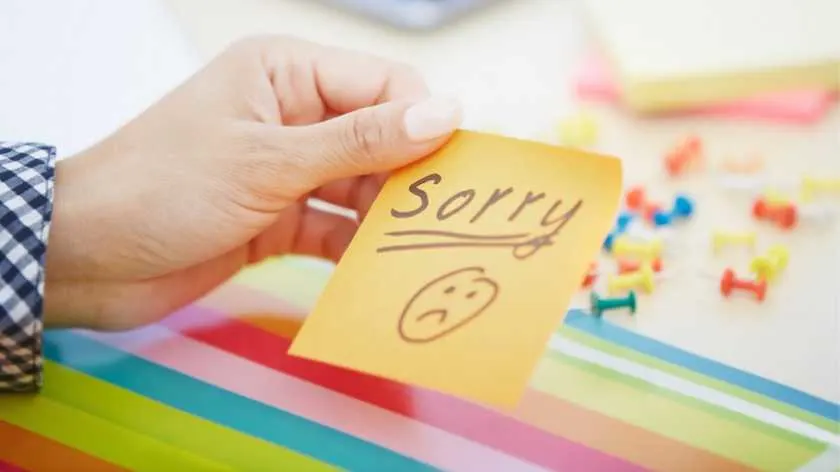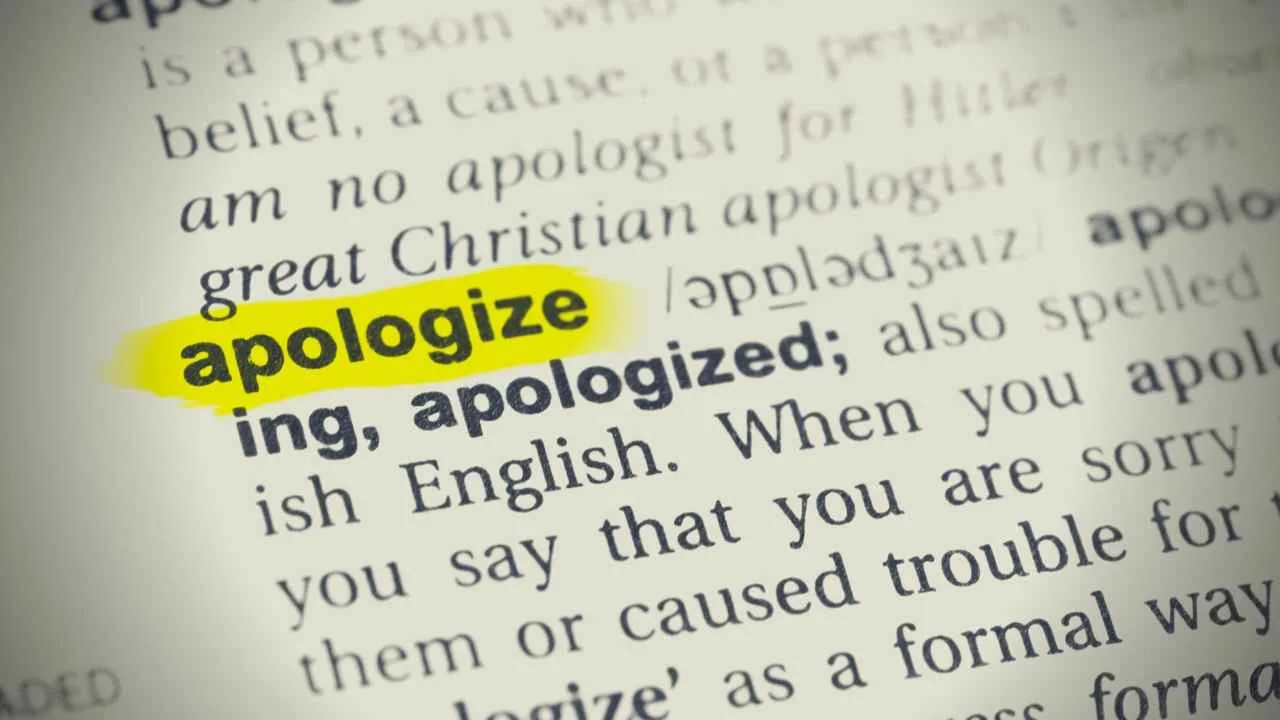Sorry! Five simple letters that for many of us comprise a large amount of our spoken vocabulary.
Whether it's for saying no, crying, or even just making a reasonable request of someone, many of us can apologize far too much!
But how do you stop saying sorry and how do you change the apologetic habit of a lifetime?
I'm sorry to tell you that I've made it my mission to find out more in this article, and challenge you to change your perceptions and attitudes towards saying sorry.
Why Do We Say Sorry So Much?
There are many different reasons why an individual may be more likely to say sorry than their peers.
Firstly, starting in early childhood, how we are raised can impact upon our apologetic nature.
We model the behavior that we see in our parents and guardians, so if those who raised you over-apologize, then you're far more likely to be overly apologetic yourself.
Children raised in households with a strong social hierarchy can also apologize more. This is because apologizing can be interwoven with politeness and respect.
Saying sorry when no sorry is needed can be a way in which children can demonstrate respect to an elder.
Speaking of being polite, some individuals find themselves frequently apologizing as they have mixed saying sorry into their overall concept of politeness.
Many spiritual people are conflict-averse, it's just part of seeing the world through a deeper lens; small spats and disagreements simply don't matter as much.
However, this can leave us at risk of becoming overly apologetic as a way to avoid moments of conflict and keep the peace.
And lastly, sometimes it's just down to your culture.
I'm from the UK and let me tell you, we apologize for everything, even for apologizing!
Canadians also find themselves in a similar boat, and even had to institute an apology act to avoid the incorrect establishment of guilt in a court of law!
Americans, on the other hand, are found to apologize far less, saying sorry about 33% less than UK residents.
10 Signs you Apologize Too Much

For people who over-apologize, saying sorry has become an automatic response.
This means that the word is so ingrained in your mind that the brain automatically triggers the mouth to say sorry for a variety of different circumstances.
Ever said sorry and paused a moment to wonder why you said it? Ever accidentally apologized to an inanimate object?
If so you probably already have sorry as an automatic response. Let's look at some other signs that you might apologize too often.
1. Apologizing for Things Outside of Your Control
Sometimes bad things happen outside of our control, from bad weather to having to cancel plans because of car trouble, sometimes life just makes up its own mind for you, and you shouldn't apologize for it.
So if you've found yourself apologizing to a friend for their bad experience, despite having nothing to do with the cause, or apologized for some other occurrence outside of your control, you may be saying sorry too much.
2. Apologizing on Behalf of Someone Else
Now there are a few times where it is okay to do this, for example, if you're a representative of a company, but when it comes to friends, family, and colleagues, feeling the need to apologize to others for something someone else has done is a clear sign of over-apologizing.
3. Apologizing in Normal Situations
Now, this one is something that almost all Brits are guilty of, as it's just part of our culture, but people from other countries may find they do this also.
Apologizing for simple day-to-day things such as squeezing by someone at a crowded social gathering, or sneezing in a quiet space just isn't necessary!
4. Apologizing When you Know You're Not In the Wrong
Apologizing when you've wronged someone is all well and good, but apologizing for the sake of apologizing or to avoid conflict even though you know you're right only discredits you and chips away at your self-esteem.
5. Apologizing When you Need Something
A clear sign you over-apologize is when you say sorry when asking someone for something.
While saying sorry when asking for something big or inconvenient may be suitable, apologizing for asking a colleague to do something which is part of their job description, for example sending information over email is not.
6. Apologizing Again and Again
Sometimes you might find it hard to stop apologizing.
You may feel guilty for something or bad that you've inconvenienced someone, and feel the need to apologize rise several times throughout your encounter.
7. Low Self-confidence
People who lack confidence, self-worth, or self-esteem tend to be more likely to apologize excessively.
If you feel that you're forever doing things wrong, or aren't good enough for the people around you then you may be struggling in this way.
8. Feeling the Anxious Need to Apologize
If you've struggled with anxiety in the past, and notice you most commonly apologize when you're feeling anxious, then you may be using excessive apologies as a coping mechanism.
9. Apologizing when Being Assertive
The more laid back among us can often feel like they may be being rude or aggressive when they're being assertive.
This can lead to over-apologizing and reduces the authority or assertiveness that was required for a particular situation.
10. People tell you to Stop Apologizing
When we can't identify a problem ourselves, our friends, family, and colleagues usually will.
Therefore, if you haven't noticed any of the previous signs, but find that those around you are telling you to stop apologizing, you likely have an apology-problem that you need to work on.
The Benefits of Apologizing
Of course, as spiritual individuals, we know that everything in life is about balance.
While over-apologizing is something to be discouraged and worked on, there are also many benefits to sincere apologies.
The important word to take away here is ‘sincere', which is one of the largest drawbacks of saying sorry too much as your apology loses its authenticity and meaning.
A sincere apology can encourage forgiveness, reduce hostility, and repair broken relationships.
In 21st century networks and social circles the ability to show emotional vulnerability, such as by saying sorry can be viewed positively too.
Saying sorry is also the first step in a healthy healing process after a disagreement or negative event.
The Negatives of Being Over Apologetic
Being over apologetic however comes with some heavy negatives, which is why learning to stop saying sorry is important.
Firstly, people can lose respect for you or change their view of you.
When people over compliment others, for example, they can be seen as sucking up to them for a favor.
Similarly, when you apologize all the time you can give off the impression of lacking confidence, lacking an opinion or voice, and can give unkind individuals the chance to treat you badly or abuse your trust or confidence.
Secondly, just like the boy who cried wolf, saying sorry frequently lessens the impact of the times when you sincerely apologize.
Put simply, sorry will have less meaning due to how often you say it.
Thirdly, and most importantly, saying sorry too much can lower your self-esteem and perception of self.
Apologizing frequently regularly puts you in the social position of ‘the lesser'.
When you apologize you acquiesce to the other person or group that you have done wrong, and are therefore verbally bowing your head to the ‘wronged' party, thus temporarily lowering your social status.
This is why a sincere apology is effective, as the person apologizing is making themselves vulnerable to the wronged party.
However, in the case of over-apologizing, this can cement in your subconscious that you are lesser or lower than your peers or colleagues, which lowers your overall self-perception and esteem.
How to Stop Saying Sorry in 5 Steps

Now, if you're reading this article and realize you're an over-apologizer don't worry! You're not alone, (I'm one too) and there are some very easy ways in which you can start to turn the tide and reduce the number of times you say sorry.
Here are some simple steps to help you reclaim power over your apologies.
1. Practice Self-awareness
As spiritual people, we already tend to be more attuned to ourselves, but sometimes we can become blinded to our faults, which is often why the first time you notice you over-apologize is when a friend tells you.
It's important to listen to those around you and start to look within to assess your habits and behaviors.
Being able to spot when and where you apologize will help you to notice patterns that can then be worked upon.
You may find that these moments of reflection or meditation at the end of each day may help you to feel more self-aware and start to notice the presence of apologetic habits.
2. Learn When to and When Not to Apologize
This one can be pretty tricky if you come from a culture of apologizing like the UK or Canada, as the waters can be quite muddled as to when apologies are needed.
Oftentimes however we apologize simply because we're not sure if we need to or not, but want to safeguard ourselves from appearing rude in public, so we apologize anyway.
Spend some time watching others around you, in the office or your friend circle, notice when they apologize and when they don't.
Also, when you find yourself apologizing take a mental moment to reflect upon the instance – was it a time where an apology was needed?
3. Change up Your Script
This step takes some work, so you shouldn't beat yourself up if you have some hiccups along the way.
Over time, however, this will feel natural to you. In moments where you would apologize, try saying something else.
For example, if in an email to a colleague they pick up on inaccuracy or a typo, instead of saying sorry, say; ‘thanks for catching that!' or ‘Whoops! Great spot!'.
This is still polite and cordial and is a chance to praise your workmate for their keen eye instead of apologizing for your honest mistake.
3.5 Substitute Your Words (Optional)
This step is optional and is mostly for those of over-apologizers from countries or places with a culture of apologies.
It's much harder to avoid saying sorry in places where everyone else does, and it can be seen as rude not to.
However, if saying sorry frequently is spilling over into your interactions with friends or workmates, then you still need to take action.
I propose substituting the word sorry for alternate polite phrases such as ‘pardon me' or ‘excuse me'.
These words can take the place of sorry as your apologetic go-to and can leave the word ‘sorry' reserved for sincere apologies.
4. Reclaim your Assertiveness (and Say No)
Being assertive doesn't come naturally to everyone, but it is important to remember there are so many different ways in which you can show assertiveness.
Being confident in your decisions and reasoning and standing by them is a great way to be assertive without feeling as though you are bossing others around.
Most importantly, learn how to say no (and don't apologize directly afterward!).
When someone asks something of you there are always two options, that's why it's a request and not a command.
For example, if you're already under a heavy workload, and your workmate wants to add more to your pile, you're well within your rights to say no.
If you are uncomfortable leaving things at a flat refusal, you can explain the reasons why as this makes a great polite answer that avoids apologizing.
4.5 Use Technology to your Advantage (Optional)
21st Century life is full of so much useful technology, so why not use it to your advantage. In regards to over-apologizing, there's a lot of different great resources at your disposal.
The ‘Just Not Sorry‘ plugin, for example, notifies you whenever you writing contains apologetic words or phrasing which might undermine what you're trying to say.
There are also a variety of mediation and yoga guides with positive affirmations to help you increase your assertiveness and improve your self-esteem.
5. When it's Time to Apologize
Of course, apologies still have their place in polite society, and when it's time to genuinely apologize, you need to know-how.
To give a meaningful apology you need to remember the three R's; regret, responsibility, and remedy.
Firstly, show regret, this is where you let the other person know you regret the actions you took.
Next comes responsibility, this is where you take ownership of the wrong or hurtful actions that were taken.
Lastly comes remedy, while your actions cannot be undone, you can take steps to repair the damage that you have caused.
This might be by replacing the item that you broke for example, or showing how you won't allow the situation to happen again.
Reclaiming your Authority
The best thing about learning not to say sorry so often is reclaiming your authority.
Without apologies littering your vocabulary those around you will start to view you as a much more authoritative voice and you'll find that your words have more meaning.
Best of all you'll find your self-esteem is boosted, allowing you to step forth into the world with more confidence allowing you to achieve more than you ever thought possible, and without a meaningless apology in sight!
I’m Chloe, an introverted, old soul, just trying to make my way in the world! Aside from studying and writing about the spiritual, I fill my spare time with reading and making all manner of things from knitted scarves to clay creations. I define myself as a ‘low-key Pagan’ and focus my attention on living a good, kind, and empathic life. For enquiries contact me at: [email protected]


